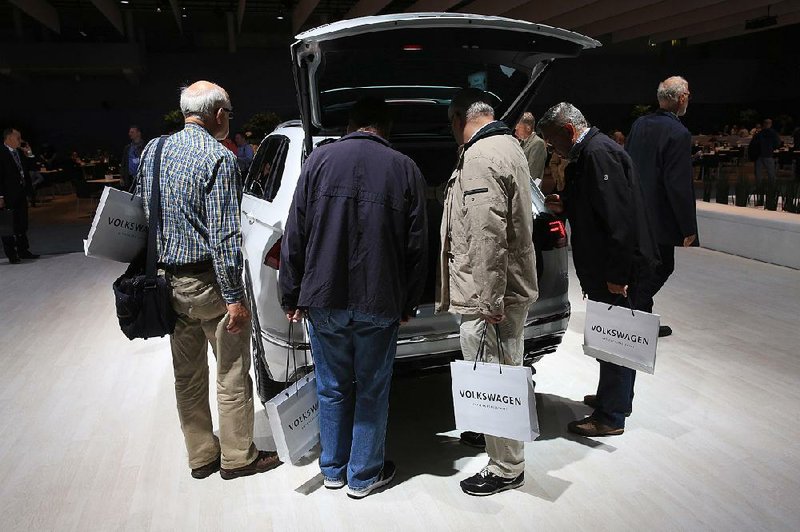HANOVER, Germany -- Volkswagen shareholders had a lot to complain about Wednesday. Management bonuses, sagging profits and an emissions scandal have all caused the company's stock to plunge.
Whether those complaints will make any difference is another question.
Institutional investors and individual shareholders have grown increasingly restive about what many see as Volkswagen managers' failure to adequately explain who was responsible for the emissions scandal, as well as their refusal to fully give up bonuses even after the company reported its first annual loss in more than two decades.
"They have been rewarded for failure," said Hans-Christoph Hirt, co-director of Hermes EOS, a firm that represents large institutional investors.
Addressing the meeting, Hirt urged shareholders not to re-elect the supervisory board, saying its members were ultimately responsible for a "culture in which the emissions scandal was able to unfold and remain undetected for many years."
But with outsize influence in the hands of a few large shareholders, top management at the company faced little threat to its authority.
Descendants of Ferdinand Porsche, inventor of the Beetle, own a majority of the voting shares, while the state of Lower Saxony owns 20 percent and the sovereign wealth fund of Qatar holds 17 percent. Just 11 percent of the company's stock is held by outside shareholders, and holders of Volkswagen preferred shares, the most actively traded, are entitled to dividends but cannot vote.
Numerous shareholders filed motions to block the management board's actions, approval of which is normally a formality. But it was a foregone conclusion that the critics would not be able to muster anywhere near enough votes to succeed.
The meeting began with a speech by Hans Dieter Poetsch, the chairman of the supervisory board, who repeated the company's assertion that top executives were not aware of the gravity of the emissions problem until shortly before the U.S. Environmental Protection Agency issued a formal complaint. As Poetsch spoke, top executives and members of Volkswagen's supervisory board listened impassively from a large stage.
In a sign of dissenters' lack of clout, a motion to remove Poetsch as chairman of the annual meeting was rejected by shareholders holding 98.8 percent of the voting shares present. Manfred Klein, a shareholder who argued in favor of the motion, said Poetsch had a conflict of interest because he was the chief financial officer during the period when the emissions deceit took place.
"You've saved your neck with the votes of" Porsche's descendants, Klein said, ignoring a flashing red light that indicated he had exceeded his allotted time. "Get out of here!"
Volkswagen's travails have focused attention on the company's unique ownership structure and its imperviousness to outside pressure.
In many ways, the company is the last bastion of what was once known as Germany Inc., a web of cross-shareholdings among German banks and corporations that insulated them from the whims of the stock market.
David Bach, associate dean at the Yale School of Management, said such structures allowed Volkswagen and other companies to take a longer term view. But it also isolated them from outside criticism and encouraged complacency.
Wednesday's session, held at a vast exhibition grounds, forced top managers to confront shareholders face to face, two days after German prosecutors said they had opened an investigation into Martin Winterkorn, Volkswagen's former chief executive, and another member of the management board. The men are suspected of violating German securities laws by waiting too long to inform shareholders that U.S. authorities were investigating the company's use of software to deceive pollution tests.
Prosecutors did not name the second executive, but Volkswagen confirmed Wednesday that he is Herbert Diess, the executive in charge of the Volkswagen brand. Diess, a former BMW executive who joined Volkswagen in July, appeared with other members of the management board in Hanover and gave no indication that he planned to resign.
Prosecutors acted at the behest of Germany's financial market regulator, known as BaFin. The agency concluded after its inquiry that all of the members of the Volkswagen supervisory board should be held responsible for failure to inform shareholders, according to a Reuters report, which was confirmed by a person with firsthand knowledge of the decision but who was not authorized to speak publicly.
Klaus Ziehe, a spokesman for the prosecutor in Braunschweig, which is handling the case, declined to comment. But he said it was possible the number of suspects could grow.
The shareholder meeting also could have legal significance. A group of investors submitted a motion for a special inquiry into the role of top management in the emissions scandal.
If, as expected, the company's main shareholders reject the motion, the way would be clear for shareholders to pursue their demand for an inquiry in court.
Business on 06/23/2016
